Robert Barnes
An English Lutheran, an English Reformer, a Christian Martyr
(1495-1540)
The work of God – the Protestant reformation.
October 31st many Protestants commemorate this day as the day that the Protestant Reformation began with Martin Luther nailing his 95 theses on indulgences to the Wittenberg castle door. (10/31/1517)
God moved a German monk and cleric (religious leader) and university professor of theology to read His word and to teach His word.
And in doing so, Luther was converted to Christ. Luther found Christ and the gospel of Christ in the Bible. (Jn.3:16, Lk.24:25-27, I Pt.1:10-12)
Luther was converted by God the Holy Spirit applying Romans 1:17 to his heart.
Romans 1:16. For I am not ashamed of the gospel, for it is the power of God for salvation to everyone who believes, to the Jew first and also to the Greek. 17 For in it the righteousness of God is revealed from faith to faith; as it is written, “BUT THE RIGHTEOUS man SHALL LIVE BY FAITH.”
Notes: Luther described his conversion as a moment of awakening and said that he was born again after discovering that Paul was referring to a righteousness that God gives to people through His grace.
Luther’s conversion occurred while he was lecturing on the Psalms in 1519.
Application.
I don’t want us to miss some important truths here.
Luther was a member of the visible church; he had the word and the sacraments. And yet he was previously unconverted. Luther was a church officer, a teacher of theology. And yet he was previously unconverted.
Oh Beloved, the church does not save. The word and the sacraments left unapplied by the Holy Spirit do not save or sanctify. Church office does not save. Only God by His sovereign grace causes the true spiritual growth by His word.
But we see clearly that God used and uses His word to convert sinners to Himself.
The word of God does the reforming, by the power of the Spirit of God. (James 1:18, I Pt.1:23-25, Rom.10:1-17)
 The word of God – the Scriptures in the common languages. And therefore, as you might expect the Protestant Reformation was a “back to the Bible movement”.
The word of God – the Scriptures in the common languages. And therefore, as you might expect the Protestant Reformation was a “back to the Bible movement”.
Originally Luther and others, still in the Roman Catholic church, wanted to reform the Roman Church to conform to the Bible.
But as we know, Rome wanted Luther to recant, they did not want to reform.
As an aside, the Roman Church claims “infallibility” for their official dogmas. By definition you cannot reform a so-called “infallible” church.
The modern Protestants that seek to bring official Roman Catholic doctrine closer to the Protestant views of say, sola Scriptura, or of justification by faith alone in Christ alone, are usually the ones that will be drawn towards the Roman views. Rome does not change. Not really. Not substantially. Beware Protestant of losing the gospel that the Reformers gave you.
Now, out of the turmoil of the Reformation came countless blessings. At least how we see it, as Protestants.
One of the blessings that the Protestant Reformation gave us, is that it gave the common people the holy Bible in the common languages, which means gave us Christ and the gospel of Christ, salvation in Christ. (WCF 1.1)
For a more detailed examination of this, look at our website, there is a blog post dealing with this subject.
The providence of God – the printing press.
Connect this religious reform movement, under the providence of God, with another advancement, also under the providence of God, the printing press. (WSC 11, Eph.1:11)
Circa 1440 a German goldsmith, Johannes Gutenberg, invented the famous Gutenberg printing press, with moveable type. He revolutionized producing books and other materials. He enabled the mass production of the printed word.
This piece of machinery was used mightily by God working through men to get His holy word into the hands of the masses, sinners in need of a Savior.
John Foxe an English minister and theologian and historian (1517-1587) wrote about the marvel of the Gutenberg printing press,
“Either the pope must abolish printing or printing will doubtless abolish him.”
“God has opened the press to preach, whose voice the pope is not able to stop.”
So, God used the technology of a goldsmith/printer to advance Christ’s cause in the world.
This gives credence to the Protestant doctrine of calling. All stations can be used to glorify God. (Col.3:17)
The English reformer. One of my former professors, Dr. James McGoldrick has a book, Luther’s English Connection, in which he highlights two English men that were greatly influenced by Martin Luther and that were instrumental in bringing the Protestant Reformation to England.
The two men examined were Robert Barnes and William Tyndale.
This is especially important for us because our immediate religious tradition of Westminsterian Presbyterianism is English Protestantism.
But we see it was German Lutheranism that gave the English the gospel. Luther was the seed bed for the English Reformation.
The evangelical nature of Christianity.
We learn those that truly know Christ manifest the evangelical nature of true Biblical Christianity.
When a sinner meets Christ savingly, he longs for other sinners to know Christ savingly. And so, he or she, speaks to those around them, to come and see Christ. This is like Andrew bringing his brother Simon-Peter to Christ Jesus. (Jn.1:35-41)
The universal nature of Christianity.
Another thing we see is true Christianity is properly international, embracing every tribe, tongue and nation. (Mt.28:18-20, Rev.5:9, Acts 1:8-10)
Germany to England to America, and so on. (Acts 16:7-10)
The ecumenical nature of Christianity.
The other thing I want us to see is the proper ecumenical nature of true Biblical Christianity. And by this I mean that there are many denominations of true Believers in Jesus, who share the same Gospel but we may differ on secondary and or tertiary doctrines, yet still we are serviceable to one another.
 Again I say, it was German Lutheranism that gave the English the gospel. Luther was the seed bed for the English Reformation.
Again I say, it was German Lutheranism that gave the English the gospel. Luther was the seed bed for the English Reformation.
In 2008 at our Reformation Service, we looked at William Tyndale and the English Bible.
The English reformer the Lutheran Robert Barnes.
Tonight, I would like us to look at the lesser-known man, Robert Barnes.
The modern Lutherans, the ones that know their religious heritage, hold Barnes as a saint, and they have a feast day on the day he was martyred in July.
I am not arguing in favor of feast days. I am arguing for knowing our religious history, which is a species of Hebrews 11:1-40, the great cloud of witnesses – or of martyrs.
His birth.
Robert Barnes was born in 1495 at Lynn in Norfolk England, which is about 40 miles from Cambridge England.
Even though we do not know it we, as modern Believers, have been blessed by the work of this unknown man from this unknown place.
How many spiritual (and material) blessings do we enjoy by countless anonymous Believers throughout the ages?
Even this teaches the providence of God governing all His creatures and all their actions. (WSC 11) And all of these things to build up the kingdom of Christ. (Acts 17:26-28)
His religious life.
At the age of 19 (in 1514) he enrolled to become a monk in the Austin monastery in Cambridge.

Monk comes from the Greek word monachos, which comes from the root word monos, meaning single or solitary or alone.
So, a man who is a member of a religious order that lives alone, either in solitary exclusion as with the ancient desert monks, or in a monastery as was popular in medieval times.
Often these places were seen as places to work out one’s salvation, and as place to keep unspotted by the world.
Austin is one of the old ways to refer to St. Augustine.
As an aside, Luther also was a member of an Augustinian order of monks.
So, Barnes was a Roman Catholic and a serious one at that.
He had obvious religious affections and actions, so not nominal in his beliefs or temperament.
In fact, he had a quite fiery temperament, which was both a blessing and a curse.
We might say, God took a zealot for false religion and changed him into a zealot for true religion.
This is much like the Pharisee Saul being changed into the apostle Paul. (Phil.3:1-14)
God uses zealots. Christ chose a man name Simon to be one of His apostles, he was a zealot. (Mt.10:4)
And God also uses men of gentler dispositions.
Not all Believers have the same gifts and or natural constitution, by God’s design of The Body. (I Cor.12:1-31)
Luther also was a zealot.
As an aside, can you advance a reform movement without zealots? I think not.
His religious education.
In the monastery Barnes would have received medieval catholic religious education.
University of Louvain.
Also, in 1517 the leaders of the monastery must have seen a keen intellect in Barnes as they sent him to the University of Louvain. 
Again, much like Luther was sent by Johann Staupitz to the university of Wittenberg to learn and then to teach theology.
Erasmus.
And we know the great scholar Erasmus was at the University of Louvain from 1517-1521.
And Erasmus, the great humanist, was a proponent of the Renaissance view of ad fontes, back to the source.
In this context, it meant reading the Bible in the original languages.
And likewise to read the ancient fathers in their languages of Latin and Greek.
A word here. Erasmus stayed within the Roman Church. God used the linguistical work of a Roman Catholic scholar of the Bible to produce a Greek New Testament, in part, to convert the leaders of the Protestant Reformation, and ultimately to give the world the Word of God.
Think on that.
Pauline epistles.
At the university, Barnes began an extensive study of Erasmus’ New Testament in Greek, and especially of the Pauline epistles.
Again and again, this is tracking with how God drew Luther to Christ.
And this became formative in his religious leanings.
The same with Luther.
The author John Foxe, of Foxe’s Book of Martyrs writes that,
“At the university Barnes became mighty in the Scriptures.” (Acts 18:24-26)
Also in this time, while at the University he read certain tracts by Luther.
Then as now the academy does (or should) afford the student the freedom to consider various points of view as an intellectual pursuit.
Of course, in a catholic context you would be reading them as error to refute them.
But the Bible has power. (2 Tim.3:15-17) The Gospel has Power. God can use the gospel word to convert even a man trying to refute the gospel word.
The Gospel is not bound. (Rom.1:16-17, I Thess.1:5)
Denounced clerical corruptions.
Early on his preaching was against ecclesiastical abuses, and not specifically on gospel doctrine.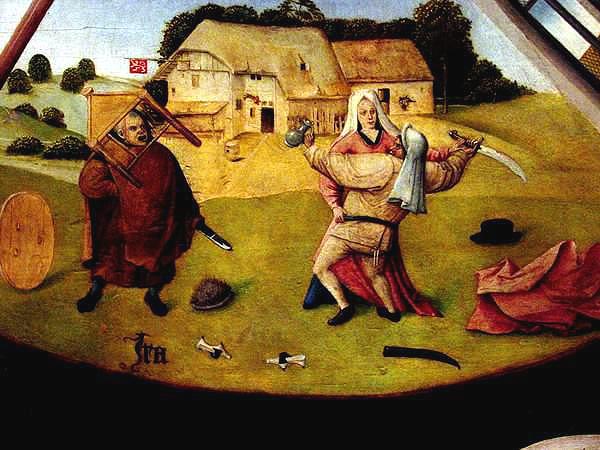
This is similar to Jan Hus, the Bohemian Reformer. (1369 – martyred/burned July 6, 1415)
Against sinful clergy.
Barnes vehemently preached against abuses by bishops as hypocritical leaders.
Christ did the same thing. Read Matthew chapter twenty-three.
Against prohibition of the Bible to the laity.
Barnes preached against the Romanish view that the laity ought NOT to read the Bible.
He wrote,
“It is lawful for all manner of men to read the holy Scripture. ”
He cites 2 Timothy 3:14-17 as proof laymen ought to read the Bible for themselves.
He connects the prohibition of the Bible to the laity with Antichrist.
He goes on to say,
“How can Antichrist be better known, than by this token, he condemns the Scriptures and makes it heresy and high treason against the king’s grace for laymen to read holy Scriptures. ”
He writes this as a Roman Catholic! Not very safe.
Against non-Scriptural religion.
He hated all superstitious, non-Biblical religion. (Mk.7:1-14) This means he hated religion based on the religious traditions (and writings) of man.
Against images as idolatrous.
He especially abhorred the use of images and prayers to saints as being contrary to the word of God. (Exod.20:4)
Against simony.
And Barnes held that the Roman church allowed these things for profit, so they would not lose the people’s money. He hated all forms of simony. (Acts 8:5-25)
He writes,
“Because you are hypocrites and insatiable belly-gods, you care not (so you may deceive the simple people and lead them with blind shadows, thereby to fill your offering boxes and chests to maintain your insatiable appetites) how the honor of God is served or how your poor brethren’s conscience is deceived.”
Embraced evangelical doctrines.
But he had not yet embraced the Protestant view of the Gospel, justification by grace alone, through faith alone, in Christ alone.
But Barnes met another Englishman under the influence of Luther, another Cambridge scholar, Thomas Bilney. (1495 – martyred/burned Aug.19, 1531)
And it was from Bilney’s influence that as Foxe says,
“Barnes was wholly converted to Christ.”
Again, we see that God uses one man who has found Christ, to bring another man to Christ. (Jn.1:40-51)
There is one account where Robert Barnes went to an English priest named Hugh Latimer, who surprisingly had written anti-Protestant tracts. (1487 – martyred/burned Oct.16, 1555)
Question. Are you seeing the antichrist hatred against those that wanted the people to have the word of God for themselves? Are you seeing the cost of being a true disciple of Jesus Christ against an antichrist and apostate church?
Bilney went to Latimer to hear Latimer’s confession of sin and in his confession Barnes bore witness of Christ and the gospel of Christ to Latimer.
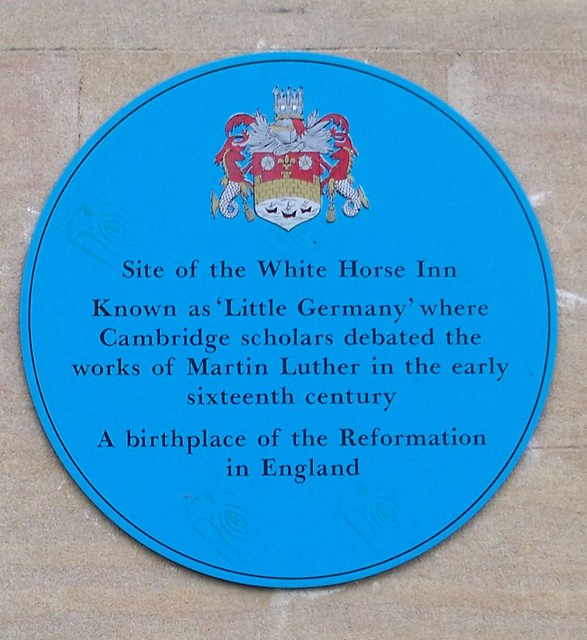 Confederated for change.
Confederated for change.
Shortly after this Latimer was converted.
And these three men, Bilney, Barnes, and Latimer formed the nucleus of a Protestant Study Group known as the White Horse Inn in 1518.
This tavern was nicknamed, Little Germany because they were taking the doctrines of Luther and bringing them to England.
Especially prominent was Luther’s view on justification by faith alone.
Barnes wrote in his exposition of justification by faith alone,
“If we truly confess Christ, then we must grant with our hearts that Christ is all our justice, all our redemption, all our wisdom, all our holiness, alone the peacemaker between God and man. We have need of nothing towards our salvation, but of Him only.”
Attacking the established church order.
McGoldrick notes that,
“Barnes was almost completely tactless in denouncing clerical abuses wherever he found them, likewise he was a vehement critic of religious superstitions – things in the church from the traditions of Man and not from the word of God. ”
The sermon that caused him to be branded a heretic and then on the run from church and state is that he preached a Christian could not legitimately sue a fellow Christian before a civil court. (I Cor.6:1-8)
He was accused of being a subversive Anabaptist.
He fled and hid in his monastery, and since they did not take money from the state as some other orders did, this afforded him a measure of safety.
But only a measure.
He was summoned to appear before Cardinal Wolsey to answer the charges against him.
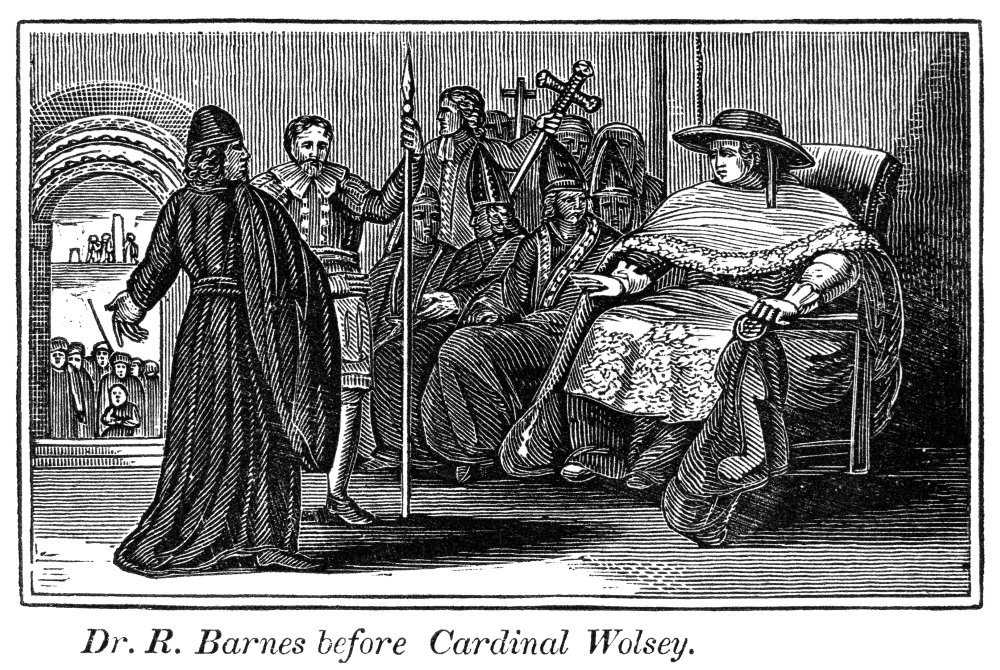
And rather than conducting himself gently towards the Cardinal, he denounced Wolsey as one of the abusers that he preached against.
He was put under house arrest.
All his Lutheran books were seized by the authorities.
The pressure was becoming too great upon Barnes, the threat of death loomed very real and very large over his head.
His friends and supporters and students urged him to recant to the Church authorities, to save his life, and to continue his work.
He agreed.
He signed a public penance at Paul’s Cross in London.
He was forced to walk in front of the profession with a lit bunch of wood/torch as a public sign reserved for heretics.
Like the apostle Peter, Barnes recanted his faith in a moment of weakness and sinfulness.
Barnes’ life was spared – for a time.
But he was sent to be incarcerated in the Fleet Prison, until the pleasure of the Lord Cardinal Wolsey was made known.
After six months in that prison, he was sent to be confined to his former monastery.
And this is where he threw all caution to the wind, and he began openly and in earnest distributing Tyndale’s English New Testament.
He was retaken by the authorities and taken to another prison, this time to be burned at the stake.
He escaped prison with a fake suicide note saying that he had jumped in the river.
And while they were searching the river, he fled to Germany, to Wittenberg.
Where he soon became fast friends with Luther and with Philip Melanchthon.
Maintaining the established civil order.
In many ways, Barnes was what is known as an Erastian, he held that the civil leader ought to be the leader in church affairs in a given realm.
(Note: Erastianism was codified by King Henry’s chief religious minister Thomas Cranmer – 1489 – martyred/burned March 21, 1556 – for heresy)
This is interesting, because at the same time Barnes was attacking the established ecclesiastical order, he was in many ways upholding the civil order.
And for him, at this time the king was King Henry VIII.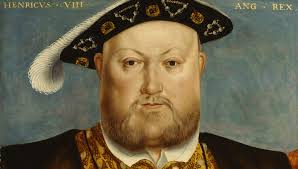
So much so, that Barnes wrote a treatise in 1531 – Supplication unto King Henry VIII given to the king by Henry’s chief minister Thomas Cromwell, a lawyer that served as Henry’s chief minister of state. (1485-1540)
Henry had Cromwell beheaded, though he was loyal. I think the charges were heresy and treason, of being a traitor.
I think the real reason was that Thomas Cromwell was one of the key figures that arranged for King Henry to marry Anne of Cleves! Bad move.
An interesting side note, King Henry’s desire to see the church reformed or true religion taken away from Rome and the pope and brought to England and given to him does not appear to have come from Henry’s deep religious or Biblical convictions.
But rather from a desire to divorce his first wife Catherine of Aragon and to remarry another woman, in fact, a number of women, successively of course.
In 1530 Henry spent over 5,000 silver crowns soliciting the opinion of German religious leader’s opinion on his divorce-remarriage desires!
Barnes asked Luther about Henry’s divorce question, the king thought Barnes would get him a favorable answer.
The King promised Barnes safety to return to England to bring him Luther’s reply.
Barnes believed the king. Bad move! Liars lie! Barnes should have known better.
Barnes came back with Luther’s answer,
“The king did not have Biblical grounds to divorce his wife Catherine, he must stay married to Catherine of Aragon.”
Barnes fell from the king’s graces. Obviously.
And though the king did not immediately set upon him, the successor to Wolsey, Thomas More did.
Barnes fled for Germany again.
Notwithstanding the German religious leader’s refusal, Barnes still considered himself a faithful royal servant of the king and continued to try to get the German reformers to reverse their position on Henry’s divorce desire.
It is thought he continued to do so, out of a belief, If Henry could get what he wanted, that this would eventually help the cause of the English Protestant reformation.
Henry eventually did not care what the Germans thought, the Bible taught.
He divorced Catherine of Aragon and by the time Barnes returned to England in June 1536, Anne Boleyn, the new wife of Henry had been executed for adultery! Which she did not confess to.
For all his loyalty, Barnes was given very little financial or material support from the crown.
He was essentially penniless. And increasingly disliked by Henry. But Henry continued to use Barnes and his connections with the Germans to advance his political causes.
And when France and Spain were threatening England, Henry sought help from the Germans and specifically by way of the Duchy of Cleves an area of land between Netherlands and Germany.
Thomas (not Oliver) Cromwell thought Henry could make a political alliance if he married the sister of the Duke of Cleves, the Lady Anne of Cleves.
 John Foxe says that Robert Barnes (along with Thomas Cromwell) was a leading figure in arranging this marriage between Henry and Anne of Cleves.
John Foxe says that Robert Barnes (along with Thomas Cromwell) was a leading figure in arranging this marriage between Henry and Anne of Cleves.
Another BAD Move. King Henry thought she was very ugly, and she stank. He never went near her.
Again Barnes was shortly repaid by Henry with the King’s publication of the Six Articles, a resounding reaffirmation of Roman Catholic theology!
They are:
1) transubstantiation. 2) clerical celibacy. 3) communion in one kind – one element contains both. 4) private masses. 5) vows of chastity. 6) auricular confession.
Denial of these punishable by death.
By this reaffirmation of the Catholic faith Henry was trying to woo the king of France.
For the unbelieving formal so-called “Christian” king Henry, religion was just a political tool.
Sealing his testimony with his blood. During Lent in 1540 the Bishop Stephen Gardiner preached against Protestant doctrines and especially justification by faith alone.
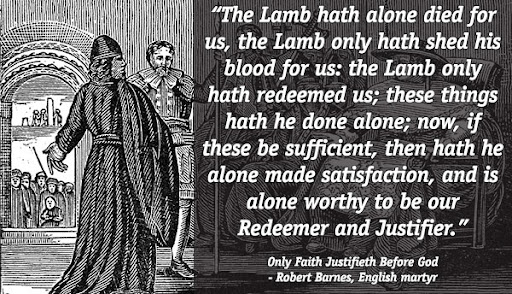 Two weeks later, Barnes preached in the same pulpit and responded defending Biblical truths especially his commitment to the belief in the full sufficiency of Christ’s death to make atonement of sins, without human works of merit.
Two weeks later, Barnes preached in the same pulpit and responded defending Biblical truths especially his commitment to the belief in the full sufficiency of Christ’s death to make atonement of sins, without human works of merit.
When asked to recant or die, instead he confessed. He chose to die holding to the truth of Christ, rather than chose life by a lie.
For this he was executed on July 30, 1540.
When Martin Luther heard the news about his old friend he said,
“It is a special joy for me to hear that our good, righteous table companion and house guest has been so graciously called by God to pour out his blood for the sake of His dear Son and to become a holy martyr.”
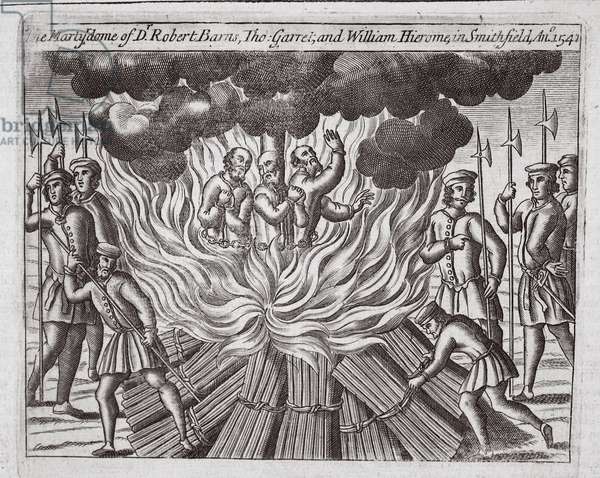
Beloved, the devil is constantly trying to stop people from reading and hearing the word of God, especially of the gospel of Christ. He wants to snatch it away.
Satan threatens the preachers of God’s word, he threatens the hearers of God’s word.
We are in a spiritual battle. Be faithful to God’s word and to Christ’s gospel even unto death.
Let me close with these words. Think of the work of Luther and of Barnes, and of countless others revealing Christ to us.
Protestant Believer, remember your history, it comes with the price of blood – Christ’s and His servants.
Revelation 12:10. Then I heard a loud voice in heaven, saying, “Now the salvation, and the power, and the kingdom of our God and the authority of His Christ have come, for the accuser of our brethren has been thrown down, he who accuses them before our God day and night. 11 “And they overcame him because of the blood of the Lamb and because of the word of their testimony, and they did not love their life even when faced with death.
Amen


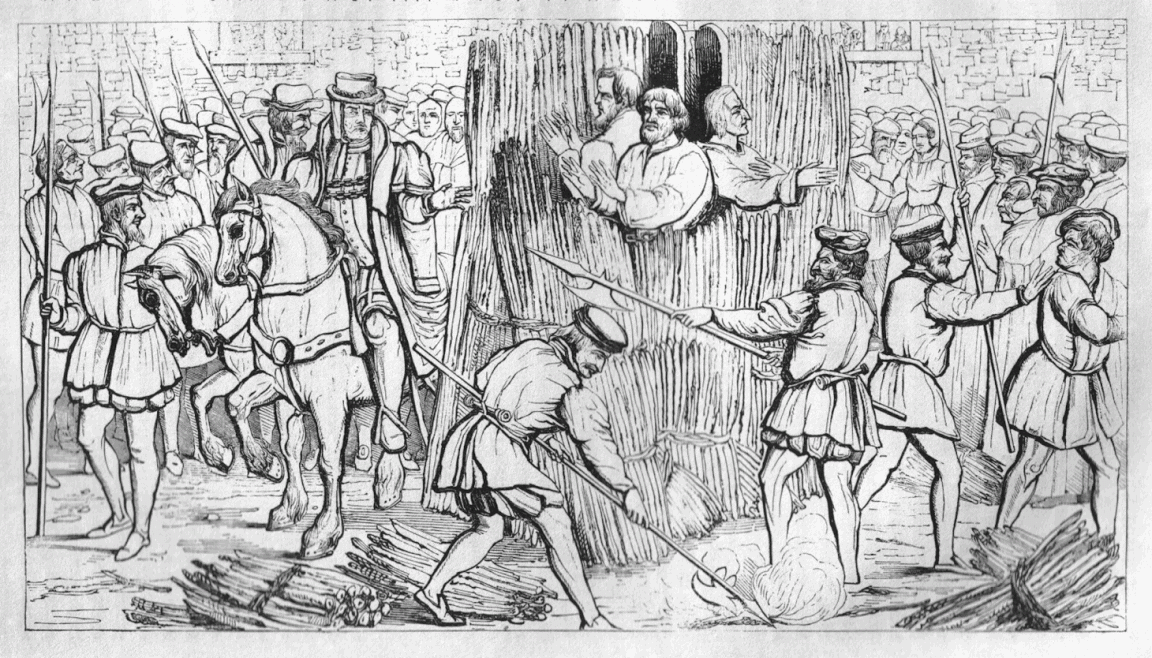
Comments are closed